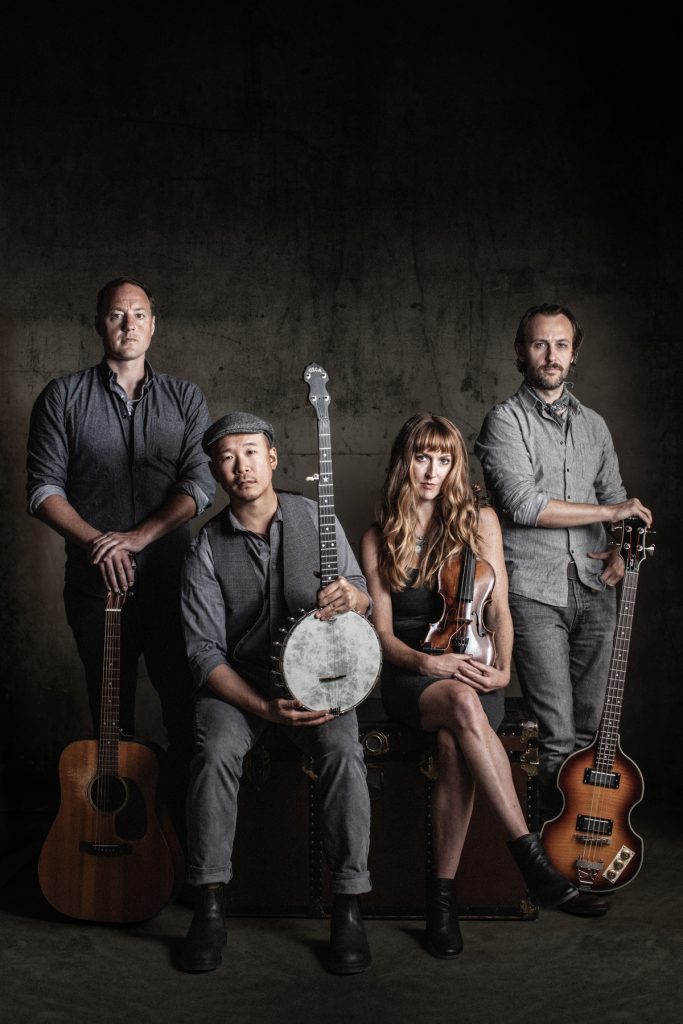
Firehall Arts Centre to November 3, 2024
Tickets from $30 at 604-689-0926 or www.firehallartscentre.ca
Posted November 1, 2024
It seemed at first a strange pairing: The Fugitives, an award-winning Canadian folk music group, and the story of Vimy Ridge, often called “the war that made Canada”. But a more sensitive, thoughtful, deeply personal look at what really went on at Vimy is hard to imagine. “I don’t know”, says creator/musician Brendan McLeod, what he would have done if forced to struggle up a steep and muddy slope directly into a barrage of heavy enemy machine gun fire.
McLeod’s interest in WWI began as a youngster reading and re-reading Pierre Berton’s “Vimy”. In his teens, he reconstructed a WWI trench in his mother’s Edmonton vegetable garden and later, as an adult, he travelled to Vimy, a small farming community 10 kilometers north of Arras, France. The village was almost destroyed by the fighting that took place there back in 1917.
What made the men sign up? “Free food, free lodging and a paycheque”, McLeod suggests, and thousands of Torontonians cheering the departing soldiers. But what kept them fighting? Courage? Duty? Or simply looking out for the soldier next to you. Brotherhood forged in mud and steel.
Interspersed between songs, all WWI-era songs written by soldiers but with new arrangements by The Fugitives, are a handful of verbatim diary entries including descriptions of “squeaking and squealing monster-sized rats” in the trenches.

Amazingly, given this horrific material, Ridge is quietly, even gently, understated and contemplative. The tone is pensive and even anger, when it flares up over the death of thousands of under-aged soldiers – teenagers – who were allowed to sign up, is subdued, almost meditative.
Statistics are many but this one sticks: there were more than 10,000 Canadian killed or wounded at Vimy. It would take 9-1/2 hours to say their names. And McLeod reveals some truths we, as Canadians, find hard to hear: Canadian soldiers who deserted were executed and in at least in one case, the brother of a condemned 17-year-old deserter was forced to witness his brother’s execution. First Nations soldiers who fought side by side with non-indigenous soldiers were still not allowed to vote when the war was over. And women were given the vote but only if they had a male relative who served. Uncomfortable truths.

The setting on the Firehall stage is simple: wooden crates and wooden chairs but the lighting by Jonathan Kim is exquisite: warm and vintage, fading into shadow between songs. Under the direction of Julia Course, musicians Adrian Glynn (bass, guitar, harmonica), Carly Frey (violin), Christopher Suen (banjo, ukulele) and McLeod (guitar and bass) also provide vocals with often haunting harmonies. Some of the songs are darkly funny: “If the sergeant steals your rum/Never mind” but the song finishes with, “If your mate just lost his sight/Never mind . . . Though they’ll send him home it’s tough, he’ll be great for blind-man’s bluff”. No doubt gallows humour got a lot of soldiers through those terrible times.
For a piece about a horrendous event in Canadian history, Ridge is surprisingly gentle – which is not to say McLeod and The Fugitives are insensitive to the horror of WWI: not at all. But the events are framed in such a way that they invite thoughtful reconsideration. If the war on Vimy Ridge really was “the war that made Canada” it’s incumbent upon us to look at all the facts some of which have remained hidden for years.

One song, sung by McLeod and written by Canadian Frank E. Balson, lingers so sadly:
“Take me back to old Ontario where the sun does ever shine
Where the tall and stately maples rear their branches to the sky
Take me back to old Ontario, where my dear old Mother lies
Take me back to old Ontario, lay me by my Mother’s side.”
One truth remains: war is hell.

